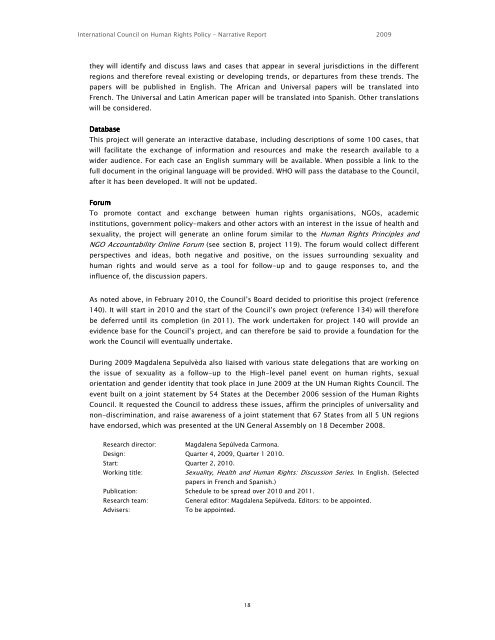NARRATIVE REPORT 2009 - The ICHRP
NARRATIVE REPORT 2009 - The ICHRP
NARRATIVE REPORT 2009 - The ICHRP
You also want an ePaper? Increase the reach of your titles
YUMPU automatically turns print PDFs into web optimized ePapers that Google loves.
International Council on Human Rights Policy - Narrative Report <strong>2009</strong><br />
they will identify and discuss laws and cases that appear in several jurisdictions in the different<br />
regions and therefore reveal existing or developing trends, or departures from these trends. <strong>The</strong><br />
papers will be published in English. <strong>The</strong> African and Universal papers will be translated into<br />
French. <strong>The</strong> Universal and Latin American paper will be translated into Spanish. Other translations<br />
will be considered.<br />
Database<br />
This project will generate an interactive database, including descriptions of some 100 cases, that<br />
will facilitate the exchange of information and resources and make the research available to a<br />
wider audience. For each case an English summary will be available. When possible a link to the<br />
full document in the original language will be provided. WHO will pass the database to the Council,<br />
after it has been developed. It will not be updated.<br />
Forum<br />
To promote contact and exchange between human rights organisations, NGOs, academic<br />
institutions, government policy-makers and other actors with an interest in the issue of health and<br />
sexuality, the project will generate an online forum similar to the Human Rights Principles and<br />
NGO Accountability Online Forum (see section B, project 119). <strong>The</strong> forum would collect different<br />
perspectives and ideas, both negative and positive, on the issues surrounding sexuality and<br />
human rights and would serve as a tool for follow-up and to gauge responses to, and the<br />
influence of, the discussion papers.<br />
As noted above, in February 2010, the Council’s Board decided to prioritise this project (reference<br />
140). It will start in 2010 and the start of the Council’s own project (reference 134) will therefore<br />
be deferred until its completion (in 2011). <strong>The</strong> work undertaken for project 140 will provide an<br />
evidence base for the Council’s project, and can therefore be said to provide a foundation for the<br />
work the Council will eventually undertake.<br />
During <strong>2009</strong> Magdalena Sepulvèda also liaised with various state delegations that are working on<br />
the issue of sexuality as a follow-up to the High-level panel event on human rights, sexual<br />
orientation and gender identity that took place in June <strong>2009</strong> at the UN Human Rights Council. <strong>The</strong><br />
event built on a joint statement by 54 States at the December 2006 session of the Human Rights<br />
Council. It requested the Council to address these issues, affirm the principles of universality and<br />
non-discrimination, and raise awareness of a joint statement that 67 States from all 5 UN regions<br />
have endorsed, which was presented at the UN General Assembly on 18 December 2008.<br />
Research director: Magdalena Sepúlveda Carmona.<br />
Design: Quarter 4, <strong>2009</strong>, Quarter 1 2010.<br />
Start: Quarter 2, 2010.<br />
Working title:<br />
Sexuality, Health and Human Rights: Discussion Series. In English. (Selected<br />
papers in French and Spanish.)<br />
Publication: Schedule to be spread over 2010 and 2011.<br />
Research team:<br />
General editor: Magdalena Sepùlveda. Editors: to be appointed.<br />
Advisers:<br />
To be appointed.<br />
18
















